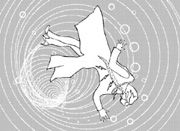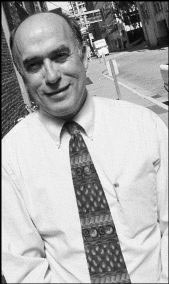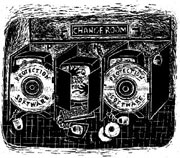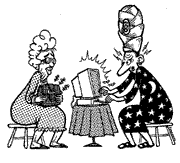WATCHING THE GREEN party in action is a lot like watching reruns of the old Muppet Show. It’s not just that their twice-anointed candidate for president, Ralph Nader, bears a passing resemblance to Kermit the Frog; the whole production has the air of a show being put on by a determinedly earnest, but not quite professional, group of friends.
Until Nader decided to become its figurehead for the current election cycle, it’s doubtful that very many people even knew a Green Party existed in America. When the Greens held their state convention in Gas Works Park in June, the “Nader for President” lawn signs threatened to outnumber the participants. At any one time the crowd barely surpassed 100, though they did manage to collect the required 200 signatures to place Nader’s name on the party’s line on the November ballot.
“There is a Green Party in this state? I think this has got to be one of those things the press is drumming up because they’re bored,” says Jim Kainber, executive director of the Washington State Democratic Party. “Six hundred members—that should say it all,” he adds when told of their membership claims.
Kainber is equally dismissive of the Greens’ presidential candidate. “Ralph Nader is a nonstarter,” he claims. “If you look at the Ralph Nader Web site, it doesn’t even talk about the environment. How can that be a green party?” he continues. “The fact of the matter is that we have a clear choice between George Bush, who has an abysmal record on the environment—if you’re a Green Party person, presumably you’re looking at the environment—[and] we have Al Gore, who has an excellent record on the environment. Choose one. Don’t try to play the spoiler with your one vote.”
With a dismissal that vitriolic, it’s obvious that Nader does have Washington Democrats worried. On the national stage, most of the attention the Greens have gotten has been as spoilers for Al Gore’s chances of winning the presidency, particularly in the western states, where Nader polls the strongest. A CNN/USA Today/Gallup poll taken in June gave Bush 48 percent of all likely voters to 44 percent for Gore in a two-way race. With Pat Buchanan and Nader added in, the numbers were 46 percent for the Texas governor to 41 percent for Gore, 6 percent for Nader, and 2 percent for Buchanan.
Green activists, like most third party partisans, have been hearing the “spoiler” argument for years. “You can’t spoil a system that’s already spoiled,” says Robin Denburg of the Seattle Greens. “The system is spoiled—we’ve got essentially one party with two heads, so I think that the ‘spoiler question’ is really a nonquestion. I just don’t think there’s a significant enough impact of having Bush elected, rather than Gore, to worry about this concern. If the Democrats lose an election because the Greens take a lot of votes, then maybe the next time around the Greens will have enough votes to win the election,” he says optimistically.
Sean Rockhold, field coordinator for the Washington Nader for President effort, notes, “People have this fear instilled by the major parties that if you look for an option, you’re going to end up getting screwed. The thing is, until people look for an option and really push hard for an option, they’re going to continue to get screwed by the current system.”
While the Greens hope to use the presidential race to make great gains nationally, the party has had the most success on the local level. Denburg estimates that there are as many as 90 local officials in the US who claim Green Party membership or have run under the Green Party banner. But a closer examination of his claim raises some real questions.
For instance, the Seattle Green Party now claims five members of the Seattle City Council. But all of those “Greens” are also members of the Democratic Party, and few hew to the left-wing positions espoused by the Green Party. “They’re loose labels, loose affiliations,” admits Seattle City Council member Peter Steinbrueck, who endorsed Nader for president at the Green’s Gas Works convention.
THIS YEAR, the Seattle Greens hope that their first Congressional candidate will raise their profile in Washington. Cognizant of the risk that running in a toss-up district like the First could actually cost Jay Inslee or another Dem their seat, Denburg says they chose to make their first and only foray into congressional politics this year by challenging long-time incumbent Seattle Democrat Jim McDermott.
McDermott, whose district covers most of the city, is viewed as such a safe seat that the Republicans didn’t even bother to put up any token resistance last time out. His only challenges in 1998 came from Socialist Workers Party nominee Jeff Powers and antivaccine oddball Stan Lippmann. Powers attacked McDermott from the left for supporting NAFTA and what he described as knuckling under to the corporate power structure. McDermott won in a walk, capturing more than 80 percent of the votes.
Joe Szwaja, a teacher in the NOVA alternative high school and former Madison, Wisconsin, City Council member, is running a Green Party Congressional campaign on a platform that is at least superficially similar to the Socialist Workers. His campaign literature stresses his opposition to the WTO, the World Bank, and the IMF, and the threat “to our democracy by big money and corporate interests.” In addition to the backing of the Greens, what Szwaja has going for him is his high-profile work on behalf of East Timor, for which he received a Human Rights Award from the Seattle branch of the UN Association.
A large, athletic man (he teaches world history, Spanish, and weightlifting), Szwaja greets people with the readiness of an experienced politician. He is at his best fielding broad questions that allow him to fall back on general answers.
“A lot of the people that are very interested in promoting these values of environmental protection, decent working conditions for people here at home and abroad—practitioners of democracy, if you will—are very frustrated with a do-nothing incumbent,” he said, explaining his reason for running against McDermott. Pat phrases, like “promote a trade that’s clean, free, and fair, and that is people-friendly and environmentally friendly” come streaming out of his mouth. He used the term “do-nothing incumbent” to refer to McDermott no less than five times in the course of answering one question.
Where Szwaja is weakest is in talking about specific issues and presenting a coherent vision of what he might actually do in Washington. When asked what policies he would pursue in Congress, Szwaja says that once elected he would “do some extensive polling” of constituents, “and I would give a Green analysis and a Green perspective on those issues.”
At one point he turned a question about education reform around to denouncing “corporate welfare,” adding that he would use money diverted from the World Bank and similar institutions to provide more funding for schools.
The last elections showed that close to 20 percent of the city’s voters would choose anybody but McDermott. Given that most people will not see Szwaja in a debate where he has to think on his feet and define his positions in detail, he should do better than that. In this overwhelmingly liberal district, Szwaja’s anticorporate, no-to-WTO message and his affiliation with the Greens could push his numbers as high as 35 percent. Such a showing would put the Greens in a good position to recruit and run more candidates two years from now, which Denburg and Rockhold said they are planning to do.
“The issue is going to be good candidates as much as anything,” Rockhold says, “and we’re getting to the point where we’re getting in contact with good people around the state as we’re getting organized.”








